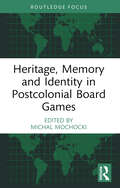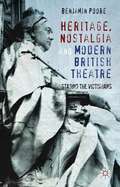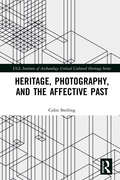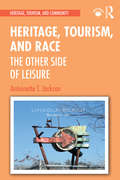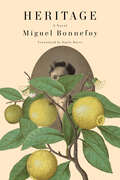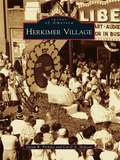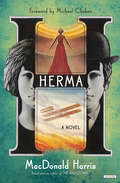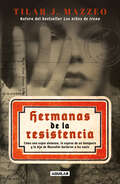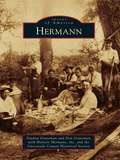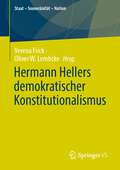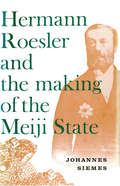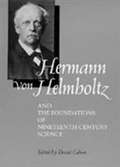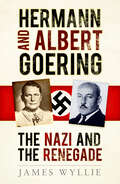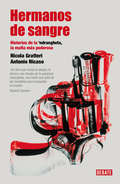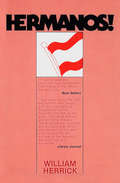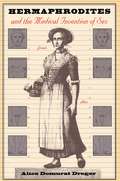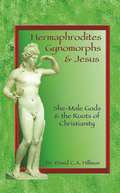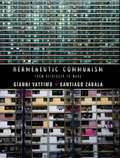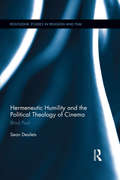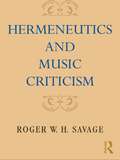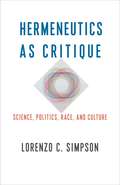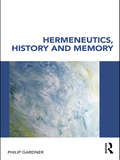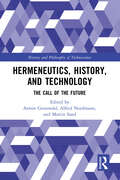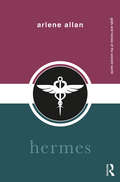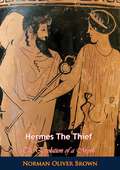- Table View
- List View
Heritage, Memory and Identity in Postcolonial Board Games
by Michal MochockiHeritage, Memory and Identity in Postcolonial Board Games is a unique edited collection that explores the interplay of heritage, memory, identity and history within postcolonial board games and their surrounding paratexts. It also examines critiques of these games within the gamer communities and beyond. Drawing on a range of international contributions, examples and case studies, this book shows how colonialism-themed games work as representations of the past that are influenced by existing heritage narratives and discourses. It also considers the implications of using colonial histories in games and its impact on its audience, the games’ players. Heritage, Memory and Identity in Postcolonial Board Games will be relevant to scholars and postgraduate students in the fields of game studies, game design or development, heritage studies, postcolonial criticism, media studies, and history. It will also be beneficial to practicing game developers.
Heritage, Nostalgia and Modern British Theatre
by Benjamin PooreThe Victorians, having once been seen as 'them', the age responsible for the mistakes of the past, were transformed by the new theatrical forms of the 1960s into 'us', a metaphor for what the nation thinks (and fears) about itself. And, since the 1980s and the rise of new biographical forms in the theatre, the emphasis has shifted further, from 'we' to 'me': plays about individuals, great and small, and their struggles for personal validation. This study argues powerfully that the stage portrayal of the Victorians in recent times is a key reference point in understanding notions of Britishness, heritage and nostalgia, and the profound politicisation of national identity over the last four decades. Using many examples drawn from theatre archives, and throwing new light on works by canonical playwrights like Bond, Edgar, and Churchill, it charts the decline in class-based narratives of the British people and the move towards plays reflecting a more atomised, individuated society, preoccupied with identity and the past but no longer able to provide a convincing account of itself as a nation.
Heritage, Photography, and the Affective Past (UCL Institute of Archaeology Critical Cultural Heritage Series)
by Colin SterlingHeritage, Photography, and the Affective Past critically examines the production, consumption, and interpretation of photography across various heritage domains, from global image archives to the domestic arena of the family album. Through original ethnographic and archival research, the book sheds new light on the role photography has played in the emergence, expansion, and articulation of heritage in diverse sociocultural contexts. Drawing on wide-ranging experience across the heritage sector and two international case studies – Angkor in Cambodia and the town of Famagusta, Cyprus – the book makes a major contribution to our understanding of the role photography has played and continues to play in shaping experiences and conceptualisations of heritage. One of the core aims of the book is to problematise and potentially redirect the varied usages of photography within current practice, usages which remain woefully undertheorised, despite their often-central role in shaping heritage. Ultimately, by focusing attention on a hitherto underexamined aspect of the heritage phenomenon, namely its manifold interconnections with photography, this book provides fresh insight to the making and remaking of the past in the present, and the alternative heritages that might come into being around emergent photographic forms and approaches. Heritage, Photography, and the Affective Past uses photography as a method of enquiry as well as a tool of documentation. It will be of interest to scholars and students of heritage, photography, anthropology, museology, public archaeology, and tourism. The book will also be a valuable resource for heritage practitioners working around the globe.
Heritage, Tourism, and Race: The Other Side of Leisure (Heritage, Tourism, and Community)
by Antoinette T JacksonHeritage, Tourism, and Race views heritage and leisure tourism in the Americas through the lens of race, and is especially concerned with redressing gaps in recognizing and critically accounting for African Americans as an underrepresented community in leisure. Fostering critical public discussions about heritage, travel, tourism, leisure, and race, Jackson addresses the underrepresentation of African American leisure experiences and links Black experiences in this area to discussions of race, place, spatial imaginaries, and issues of segregation and social control explored in the fields of geography, architecture, and the law. Most importantly, the book emphasizes the importance of shifting public dialogue from a singular focus on those groups who are disadvantaged within a system of racial hierarchy, to those actors and institutions exerting power over racialized others through practices of exclusion. Heritage, Tourism, and Race will be invaluable reading for academics and students engaged in the study of museums, as well as architecture, anthropology, public history, and a range of other disciplines. It will also be of interest to museum and heritage professionals and those studying the construction and control of space and how this affects and reveals the narratives of marginalized communities.
Heritage: A Novel
by Miguel BonnefoyA dazzling family saga, brimming with poetry and passion, that skillfully weaves together the private lives of individuals and major historical events in South America and Europe. The house on Calle Santo Domingo in Santiago de Chile, with its lush lemon trees, has sheltered three generations of the Lonsonier family. Having arrived from the harsh hills of France&’s Jura region with a single grape vine in one pocket and a handful of change in the other, the patriarch put down roots there in the late nineteenth century. His son, Lazare, back from World War I&’s hellish trenches, would live there with his wife and build in their garden the most beautiful aviary in the Andes. That&’s where their daughter Margot, a pioneering aviator, would first dream of flying, and where she would raise her son, the revolutionary Ilario Da. Like Lazare before them, they will bravely face the conflicts of their day, fighting against dictatorship on both sides of the Atlantic. In this captivating saga, Miguel Bonnefoy paints the portrait of an endearing, uprooted family whose terrible dilemmas, caused by the blows of history, reveal their deep humanity.
Herkimer Village (Images of America)
by Caryl A. Hopson Susan R. PerkinsThe village of Herkimer, incorporated on April 6, 1807, was the first village in Herkimer County and was named after Revolutionary War hero Gen. Nicholas Herkimer. First settled by the Palatine Germans in 1725, the village's ideal location at the juncture of the Mohawk River and West Canada Creek made it the focal point of the county, and it was soon designated the county seat. The village population grew with the development of mills and factories, prompting the construction of elaborate homes, churches, diverse shops, and the New York Central Railroad, which ran directly through the village center with four main line tracks. Herkimer Village provides a snapshot of the daily life and important events in this village's colorful and dynamic history.
Herma: A Novel
by MacDonald HarrisAn inventive historical novel that delves into the mysteries of gender identity, from the National Book Award–nominated author of The Balloonist. With a foreword by Michael Chabon As a child in Southern California at the dawn of the twentieth century, Herma exhibits an incredible talent for vocal mimicry. Her gift will eventually take her from the choir of her country church to the Paris Opera, thanks in no small part to the machinations of her daredevil agent. But there is a secret at the heart of their intimate relationship, in this opulent rags-to-riches tale full of excitement, sexual intrigue, and decadence, with cameos by Puccini and Proust, among others. &“Set in the first decades of the twentieth century, Harris&’ teeming novel explores the porous boundaries of gender identity. This inventive work will appeal to readers who are interested in the dual-gender theme. Opera lovers will also be intrigued.&” —Booklist &“Once I open any of MacDonald Harris&’s novels I find it almost impossible not to turn and read on, so delightful is the sensation of a sharp intelligence at work.&” —Philip Pullman, author of The Amber Spyglass
Hermanas de la resistencia: Cómo una espía alemana, la esposa de un banquero y la hija de Mussoline burlaron a los nazis
by Tilar J. MazzeoLOS DIARIOS DE UN FASCISTA Y ARISTÓCRATA ITALIANO Y LA ODISEA DE TRES MUJERES PARA SALVARLOS DE LA GESTAPO. E n 1944 se hicieron públicos los diarios secretos de Galeazzo Ciano, ministro de Relaciones Exteriores de Italia, en los que registraba los crímenes y planes nazis de los que se enteraba en sus reuniones con ellos. Pero poco se sabe que tres mujeres arriesgaron sus vidas para que estos llegaran a los Aliados, quienes luego los usarían como evidencia contra los nazis en los juicios de Núremberg. Cuando Galeazzo fue apresado, Edda Mussolini les dio a Hitler y a su padre un ultimátum: liberar a su esposo o correr el riesgo de que filtrara los diarios a la prensa. Hitler y Mussolini los buscaron en vano durante meses. Posteriormente, Hilde Beetz, espía alemana cuya misión era seducir a Galeazzo para encontrar sus escritos, fue a su vez seducida por aquél y unió fuerzas con Edda. Una terceramujer se sumó a este increíble entramado —Frances de Chollet, espía casi accidental y esposa de un banquero estadounidense— cuando Edda huyó a Suiza con la ayuda de Hilde, después de que Galeazzo fuera ejecutado. Frances fue el último eslabón para hacer llegar los diarios a los estadounidenses y cumplir así el deseo de Galeazzo. A partir de una minuciosa investigación, Tilar J. Mazzeo nos muestra este momento histórico poco conocido, para hacernos ver que sin la participación de Edda, Hilde y Frances, uno de los documentos más importantes de la Segunda Guerra Mundial y que fue fundamental en los juicios de Núremberg sería, quizá, desconocido.
Hermann
by Washington Historical Society Don Graveman Dianna GravemanHermann, Missouri, was named for Hermann der Cherusker, a German folk hero of the first century who led a successful battle against the Romans that many feel changed the course of history. In 1837, the German Settlement Society of Philadelphia, whose members hoped to establish a colony where their German language and customs could be preserved, founded Hermann and named the town for the young warrior. By the turn of the century, Hermann was a thriving river port and growing wine producer. The Hermann American Viticultural Area was officially designated in 1983, one of the earliest to be recognized by the U.S. government. Hermann hosts many events each year, including Maifest, which featured a historic pageant in the years 1952 through 1964, and Wurstfest, a celebration of the art of German sausage making. Approximately a quarter of a million tourists visit Hermann each year to enjoy a taste of "Little Germany" in the heart of the American Midwest.
Hermann Hellers demokratischer Konstitutionalismus (Staat – Souveränität – Nation)
by Oliver W. Lembcke Verena FrickVon Haus aus Jurist und Staatsrechtslehrer, vertritt Hermann Heller einen demokratischen Konstitutionalismus, der die Wirklichkeit der Demokratie mit der Normativität des Rechts zusammendenkt. Was Hellers Werk dabei in besonderer Weise fruchtbar erscheinen lässt, ist die Verbindung von Staatsrechtslehre, Politikwissenschaft und Soziologie, die erst die komplexe Wirklichkeit der Demokratie erfahrbar macht. In seinen späten Weimarer Schriften – etwa zum Autoritären Liberalismus – zeigt sich Heller als Analytiker der Krise, der uns heute den Blick für die Herausbildung autoritärer Politikstrukturen insbesondere auf europäischer Ebene schärft. Neben dieser kritischen Perspektive auf die Konstellationen und Dynamiken der (zum Teil schleichenden) Autokratisierung politischer Prozesse lassen sich auf Grundlage des Hellerschen Werkes auch die Voraussetzungen gelingender demokratischer Stabilität benennen. Die Rekonstruktion dieses Ansatzes eines dezidiert demokratischen Konstitutionalismus steht im Zentrum des geplanten Sammelbandes.
Hermann Roesler and the Making of the Meiji State
by Johannes SiemesThat Imperial Japan closely resembled authoritarian Germany was no simple coincidence. This book explores the effect of German thought on nineteenth century Japan, focusing on Hermann Roesler-the most influential collaborator.The Meiji leadership was committed to an authoritarian form of government. At the same time it was also clearly committed to a constitutional system. The mid and late 1880's saw the efforts of Japan's most capable leaders directed to the formation and rationalization of this ambivalent system. Because German socio-political ideas played an important role in this process, it is necessary to examine closely the extent of German influences on the Japanese leaders.All the standard Western works on Meiji Japan refer in passing to the influence of German, and in particular of Prussian, political and legal theories. Of the many German scholars who worked in Japan during the mid-Meiji period who were responsible for weighty changes, Hermann Roesler is considered one of the most influential in regard to political thought. Employed by the Japanese government as adviser on legal affairs from 0878, he was until 1893 one of the most trusted and esteemed collaborators of Ito Hirobumi.
Hermann Von Helmholtz and the Foundations of Nineteenth-Century Science
by David CahanRepresents a significant contribution not only to Helmholtz scholarship but also to the history of nineteenth-century science and philosophy in general.
Hermann and Albert Goering: The Nazi and the Renegade
by James WyllieThey were the most unlikely of siblings – one, Adolf Hitler’s most trusted henchman, the other a fervent anti-Nazi.Hermann Goering was a founder member of the Nazi Party, who became commander of the Luftwaffe, ordering the terror bombing of civilians and promoting the use of slave labour in his factories.His brother, Albert, loathed Hitler’s regime and saved hundreds – possibly thousands – across Europe from Nazi persecution. He deferred to Hermann as head of the family but spent nearly a decade working against his brother’s regime. If he had been anyone else, he would have been imprisoned or executed. Despite their extreme and differing beliefs, Hermann sheltered his brother from prosecution and they remained close throughout the war.Here, for the first time, James Wyllie brings Albert out of the shadows and explores the extraordinary relationship of the Goering brothers.
Hermanos de sangre: Historias de la 'Ndragheta la mafia más poderosa
by Nicola GratteriLa extraordinaria reconstrucción del universo criminal de la 'Ndrangheta', la mafia más poderosa y desconocida. La 'Ndrangheta calabresa siempre ha sido infravalorada, considerada un fenómeno criminal menor, casi folclórico. Solo sale a la luz pública en momentos de sanguinaria celebridad, como ocurrió en Duisburgo (Alemania) en 2007, en un salvaje ajuste de cuentas en el que murieron seis personas. Crecida y fortalecida en el silencio, tiene hoy ramificaciones en todas las regiones italianas y en los cinco continentes y contactos con las principales organizaciones terroristas y criminales del mundo. Nicola Gratteri y Antonio Nicaso son los mayores expertos mundiales sobre esta organización criminal, cuya evolución no ha anulado los antiguos rituales, que han sido readaptados, pero nunca descartados. Una liturgia en la que conviven el arcángel san Miguel y mitos ancestrales, invocaciones improbables al Evangelio y a la religión cristiana, y pintorescos rituales de iniciación centrados en el protagonismo del «vínculo de sangre». Un universo simbólico que puede parecer extraño e incluso delirante, pero que resulta muy útil para conservar una sola identidad en cualquier lugar y ocasión. Gratteri y Nicaso han logrado una extraordinaria reconstrucción de la historia y la atmósfera de un universo criminal de asombroso alcance y brutalidad. Reseñas:«El libro que revela la sangre, el dinero y los rituales de la poderosa 'Ndrangheta, una mafia que salió de las montañas para conquistar el mundo.»Roberto Saviano «La obra máxima, la piedra angular de lo que concierne a la 'Ndrangheta y su escalada al poder mundial de las organizaciones criminales.»Benny Calasanzio Borsellino
Hermanos!
by William HerrickThe Spanish Civil War was the last in Europe to be fought for idealistic reasons. When it ended, idealism had been totally and tragically defeated. Hermanos! is about the men and women who came to Spain as volunteers from every corner of the world--Germany, Ireland, the USA and Britain--to join the International Brigades in what they saw as a crusade against fascism. It is about the cruel war they fought, and the terror and murderous fury of the battles in which most died. It is also about the politics of international socialism and of those who infiltrated into Spain and intrigued for power, and the weapons--distortion, secret police, terror, death--they used in a ruthless and cynical exploitation of idealism for their own ends. And it is about those who fought in the streets, crying, "Unios! Hermanos proletarios!" William Herrick's Spanish Civil War is far different from Hemingway's. Equally tragic, equally conscious of the dignity and nobility of the men involved, nevertheless it reveals the harsh and painful reality of the workings of politics. It is also memorable for the passionate story of Jacob Starr and Sarah Ruskin, and for its battle scenes in which Herrick manages to convey, in his sharp, idiosyncratic and sardonic style, the hope and optimism that turned to despair and inevitable defeat.
Hermaphrodites and the Medical Invention of Sex
by Alice Domurat DregerPunctuated with remarkable case studies, this book explores extraordinary encounters between hermaphrodites--people born with "ambiguous" sexual anatomy--and the medical and scientific professionals who grappled with them. Alice Dreger focuses on events in France and Britain in the late nineteenth century, a moment of great tension for questions of sex roles. While feminists, homosexuals, and anthropological explorers openly questioned the natures and purposes of the two sexes, anatomical hermaphrodites suggested a deeper question: just how many human sexes are there? Ultimately hermaphrodites led doctors and scientists to another surprisingly difficult question: what is sex, really? Hermaphrodites and the Medical Invention of Sex takes us inside the doctors' chambers to see how and why medical and scientific men constructed sex, gender, and sexuality as they did, and especially how the material conformation of hermaphroditic bodies--when combined with social exigencies--forced peculiar constructions. Throughout the book Dreger indicates how this history can help us to understand present-day conceptualizations of sex, gender, and sexuality. This leads to an epilogue, where the author discusses and questions the protocols employed today in the treatment of intersexuals (people born hermaphroditic). Given the history she has recounted, should these protocols be reconsidered and revised? A meticulously researched account of a fascinating problem in the history of medicine, this book will compel the attention of historians, physicians, medical ethicists, intersexuals themselves, and anyone interested in the meanings and foundations of sexual identity.
Hermaphrodites, Gynomorphs and Jesus
by David C. HillmanThe first western god was both male and female. All of western religion springs from the veneration of a bi-gender entity, known to the ancient world as the Gynomorph. The worship of hermaphroditic gods like the Gynomorph surfaces in ancient pagan cults as well as early Christianity.The celebration of female gods with penises impacted the development of western culture. Veneration of the Gynomorph is the basis for modern western law courts. The founders of democracy worshipped similar female divinities who possessed penises. Ritual sodomy as a means of celebrating hermaphroditic gods directly promoted the birth of western democracy. In fact, ancient priestesses responsible for guiding the worship of hermaphroditic goddesses laid the very foundations for democracy, science and philosophy.The oldest western pharmaceuticals were sex drugs used in religious initiations in celebration of the Gynomorph. Snake venoms used in cultic sex rituals were immensely popular in both Greece and Rome. In addition, abortion-inducing drugs promoted the first scientific investigations. Classical civilization relied heavily upon the use of cannabis, opiates, and hallucinogens, which were mixed with sexual stimulants. Greco-Roman witches, who served a prominent hermaphroditic goddess, Hecate, were among the earliest western scientists and naturalists.Devotees of gynomorphic divinities were the first westerners to promote the religious practice known as necromancy. The first "baptists" were cross-dressing necromancers, who celebrated the Gynomorph. Eunuchs who served the same goddess were chemically castrated with scorpion venom. Ancient pre-Christian oracles declared that the messiah must be a hermaphrodite. Christianity tried to assimilate and employ the use of necromancy. The earliest Christians used designer sex drugs in their rituals in order to venerate a messiah given gynomorphic status by church bishops.
Hermeneutic Communism: From Heidegger to Marx (Insurrections: Critical Studies in Religion, Politics, and Culture)
by Gianni Vattimo Santiago ZabalaHaving lost much of its political clout and theoretical power, communism no longer represents an appealing alternative to capitalism. In its original Marxist formulation, communism promised an ideal of development, but only through a logic of war, and while a number of reformist governments still promote this ideology, their legitimacy has steadily declined since the fall of the Berlin wall. Separating communism from its metaphysical foundations, which include an abiding faith in the immutable laws of history and an almost holy conception of the proletariat, Gianni Vattimo and Santiago Zabala recast Marx's theories at a time when capitalism's metaphysical moorings—in technology, empire, and industrialization—are buckling. While Michael Hardt and Antonio Negri call for a return of the revolutionary left, Vattimo and Zabala fear this would lead only to more violence and failed political policy. Instead, they adopt an antifoundationalist stance drawn from the hermeneutic thought of Martin Heidegger, Jacques Derrida, and Richard Rorty.Hermeneutic communism leaves aside the ideal of development and the general call for revolution; it relies on interpretation rather than truth and proves more flexible in different contexts. Hermeneutic communism motivates a resistance to capitalism's inequalities yet intervenes against violence and authoritarianism by emphasizing the interpretative nature of truth. Paralleling Vattimo and Zabala's well-known work on the weakening of religion, Hermeneutic Communism realizes the fully transformational, politically effective potential of Marxist thought.
Hermeneutic Humility and the Political Theology of Cinema: Blind Paul (Routledge Studies in Religion and Film)
by Sean DesiletsThis book revisits the tradition of Western religious cinema in light of scholarship on St. Paul’s political theology. The book’s subtitle derives from the account in the Book of Acts that St. Paul was temporarily blinded in the wake of his conversion on the road to Damascus. In imitation of Paul, the films on which Sean Desilets’s analysis hinges (including those of Carl-Th. Dreyer, Robert Bresson, Pier Paolo Pasolini, and Carlos Reygadas) place a god-blind mechanism, the camera, between themselves and the divine. Desilets calls the posture they adopt "hermeneutic humility": hermeneutic in that it interprets the world, but humble in that it pays particular—even obsessive—attention to its own limits. Though these films may not consciously reflect Pauline theology, Desilets argues that they participate in a messianic-hermeneutic tradition that runs from Paul through St. Augustine, Blaise Pascal, Karl Barth, and Walter Benjamin, and which contributes significantly to contemporary discussions in poststructuralist literary theory, political theology, and religious studies. Desilets’s insightful explication of Jean-Luc Nancy’s deconstruction of Christianity and Georgio Agamben’s recent work on religion makes a substantial contribution to film philosophy and emerging critical trends in the study of religion and film. This book puts forward a nuanced theoretical framework that will be useful for film scholars, students of contemporary political theology, and scholars interested in the intersections of religion and media.
Hermeneutics and Music Criticism
by Roger W. SavageHermeneutics and Music Criticism forges new perspectives on aesthetics, politics and contemporary interpretive strategies. By advancing new insights into the roles judgment and imagination play both in our experiences of music and its critical interpretation, this book reevaluates our current understandings of music’s transformative power. The engagement with critical musicologists and philosophers, including Adorno, Gadamer, and Ricoeur, provides a nuanced analysis of the crucial issues affecting the theory and practice of music criticism. By challenging musical hermeneutics’ deployment as a means of deciphering social values and meanings, Hermeneutics and Music Criticism offers an answer to the long-standing question of how music’s expression of moods and feelings affects us and our relation to the world.
Hermeneutics as Critique: Science, Politics, Race, and Culture (New Directions in Critical Theory #72)
by Lorenzo C. SimpsonHermeneutics has frequently been dismissed as useful only for literary and textual analysis. Some consider it to be Eurocentric or inherently relativistic and thus unsuited to social critique. Lorenzo C. Simpson offers a persuasive and powerful argument that hermeneutics is a valuable tool not only for critical theory but also for robustly addressing many of the urgent issues of today.Simpson demonstrates that hermeneutics exhibits significant interpretive advantages compared to competing explanatory modalities. While it shares with pragmatism a suspicion of essentialism, an understanding that disagreements are situated, and an insistence on the dialogical nature of understanding, it nevertheless resolutely rejects the relativistic accounts of rationality that are often associated with pragmatism. In the tradition of Gadamer, Simpson firmly establishes hermeneutics as a resource for both philosophy and the social sciences. He shows its utility for unpacking intractable issues in the philosophy of science, multiculturalism, social epistemology, and racial and social justice in the global arena. Simpson addresses fraught questions such as why recent claims that “race” has a biological basis lack grounding, whether female genital excision can be critically addressed without invidious ethnocentrism, and how to lay the foundations for meaningful cross-cultural dialogue and reparative justice. This book reveals how hermeneutics can be a worthy partner with critical theory in achieving emancipatory aims.
Hermeneutics, History and Memory
by Philip GardnerHistory is the true record of an absent past. The trust between historians and their readers has always been founded upon this traditional claim. In a postmodern world, that claim and that trust have both been challenged as never before, drawing either angry or apologetic responses from historians. Hermeneutics, History and Memory answers differently. It sees the sceptical challenge as an opportunity for reflection on history’s key processes and practices, and draws upon methodological resources that are truly history’s own, but from which it has become estranged. In seeking to restore these resources, to return history to its roots, this book presents a novel contribution to topical academic debate, focusing principally upon: the challenges and detours of historical methodology hermeneutic interpretation in history the work of Paul Ricoeur the relation between history and memory. Hermeneutics, History and Memory will appeal to experienced historical researchers who seek to explore the theoretical and methodological foundations of their empirical investigations. It will also be highly beneficial to research students in history and the social sciences concerned with understanding the principles and practices through which documentary analysis and in-depth interview can be both validated and conducted.
Hermeneutics, History, and Technology: The Call of the Future (History and Philosophy of Technoscience)
by Alfred Nordmann Armin Grunwald Martin SandFor better and worse, the future is often conceived in technological terms. Technology is supposed to meet the challenge of climate change or resource depletion. And when one asks about the world in 20 or 100 years, answers typically revolve around AI, genome editing, or geoengineering. There is great demand to speculate about the future of work, the future of mobility, Industry 4.0, and Humanity 2.0. The humanities and social sciences, science studies, and technology assessment respond to this demand but need to seek out a responsible way of taking the future into account. This collection of papers, interviews, debates grew out of disagreements about technological futures, speculative ethics, plausible scenarios, anticipatory governance, and proactionary and precautionary approaches. It proposes Hermeneutic Technology Assessment as a way of understanding ourselves through our ways of envisioning the future. At the same time, a hermeneutic understanding of technological projects and prototypes allows for normative assessments of their promises. Is the future an object of design? This question can bring together and divide policy makers, STS scholars, social theorists, and philosophers of history, and it will interest also the scientists and engineers who labor under the demand to deliver that future.
Hermes (Gods and Heroes of the Ancient World)
by Arlene AllanHermes redresses the gap in modern English scholarship on this fascinating and complex god, presenting its readers with an introduction to Hermes’ social, religious and political importance through discussions of his myths, iconography and worship. It also brings together in one place an integrated survey of his reception and interpretation in contemporaneous neighbouring cultures in antiquity as well as discussion of his reception in the post-classical periods up to the present day. This volume is an invaluable resource for anyone wanting to explore the many facets of Hermes’ myth, worship and reception.
Hermes The Thief: The Evolution of a Myth
by Norman Oliver BrownHermes is a vital and complex figure in Greek mythology—trickster and culture hero, divine child and patron of stealthy action, master of magic words, seducer and whisperer. Shepherd, artisan, herald, musician, athlete, merchant—who is this tricky shape-shifter, confronting us at every turn?In this classic, prescient work…Brown asks: Is Hermes the Thief the prototype from which, by extension and analogy, the Trickster was derived? Alternatively, is the notion of trickery the fundamental idea and theft merely a specific manifestation of it?This thoughtful study will be of interest to anyone wishing a fresh view of an important, often misunderstood, character of Greek mythology.-Print ed.
